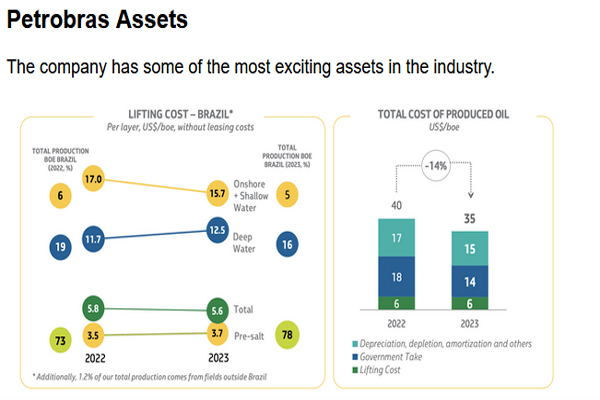
Company set to pay 22 billion reais in extraordinary dividends. Shares rose to the highest since February on the announcement
Mariana Durao, Bloomberg News
RIO
EnergiesNet.com 04 26 2024
A seven-week tug of war over Petrobras’s dividends wound up with the company delivering a 22-billion-reais ($4.3 billion) payout to investors.
Brazil’s federal government, which controls the company, proposed to pay half of available extraordinary dividends at a Thursday shareholders meeting, backtracking from a previous decision to withhold the payment.
Petrobras’ common shares gained 2.3% to close at 44.25 reais, the highest since February.
The move, which was approved by shareholders, settles a dispute that had roiled markets and intensified a power struggle between Chief Executive Officer Jean Paul Prates and members of the Lula administration. The result is a victory for both Prates and Finance Ministry Fernando Haddad, who encouraged President Luiz Inacio Lula da Silva to accept the dividends as a way to slash a budget deficit.
On April 19 the majority of Petroleo Brasileiro SA’s board endorsed the 50% payout ahead of the shareholders meeting. The government justified the reversal from a decision not to pay in March by saying the payment wouldn’t undermine the company’s finances. Petrobras may review the possibility of paying the rest of the extraordinary dividend over the course of the year.
As the company’s largest stockholder, with 50.3% of voting shares, the Brazilian government will be the single biggest beneficiary of the payout.
In March, government-appointed board members shot down a proposal from management to pay 50% of the dividends while putting the rest into a reserve fund. Prates abstained from that vote in a move that put him in the crosshairs of politicians in Brasilia. The episode fueled speculation that Prates could lose his job and caused wild swings in Petrobras’ share price.
The government wants to make sure that Petrobras has enough capital to make Latin America’s largest oil producer a motor for economic growth and job creation. Prates, a former senator, has been struggling to navigate competing expectations from profit-oriented investors and Lula. Brazil’s largest oil union criticized the dividend payment as a concession to financial markets, signaling that there could be a political backlash against the decision.
Board Members
Shareholders also approved a new board of directors that will determine Petrobras’ business strategy through 2026. A majority had their mandates renewed at a time when internal rivalries, which are normally contained behind closed doors, have spilled into public view.
Jose Joao Abdalla, a billionaire banker and one of Petrobras’s biggest shareholders, was reelected as a minority representative and publicly applauded Prates for delivering “enormous valuation” and treating investors well.
The federal government elected six candidates to the 11-member board, of which five had their mandates renewed. The list includes Pietro Mendes, who was reappointed as chairman despite challenges over alleged conflicts of interest because he also serves as the secretary of oil and gas at the mines and energy ministry. Petrobras has said that Mendes’ appointment complies with its by-laws.
Newcomers includes Rafael Dubeux, a secretary at the Finance Ministry who could help to mitigate tensions between Prates and members appointed by Mines and Energy Minister Alexandre Silveira.
Minority investors reelected Marcelo Gasparino and Abdalla. Governance expert and previous board member Francisco Petros kept his position in a separate election for voting shareholders. Jeronimo Antunes, an accountant who had previously served on Petrobras’ board, also won a seat to represent minority investors.
–With assistance from Leda Alvim.
bloomberg.com 04 15 2024












